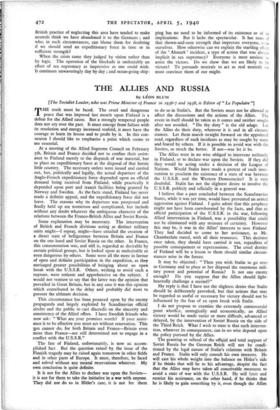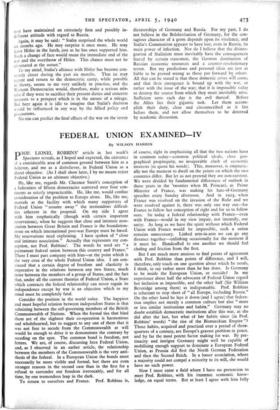THE ALLIES AND RUSSIA
By LEON BLUM
[The Socialist Leader, who was Prime Minister of France in 1936-7 and 1938, is Editor of "Le Populaire "1 THE truth must be faced. The cruel and dangerous peace that was imposed last month upon Finland is a defeat for the Allied cause. But a strongly tempered people does not cry over the past. It must emerge from failure with its resolution and energy increased tenfold, it must have the courage to learn its lesson and to profit by it. In this con- nexion I should like to emphasise a point which seems to me essential.
At a meeting of the Allied Supreme Council on February 5th, Britain and France decided not to confine their assist- ance to Finland merely to the dispatch of war material, but to place an expeditionary force at the disposal of that heroic little country. The necessary orders were issued and carried out, but, politically and legally, the actual departure of the Anglo-French expeditionary force depended upon an official demand being received from Finland, while practically it depended upon port and transit facilities being granted by Norway and Sweden. As the facts stand, Finland has never made a definite appeal, and the expeditionary force did not leave. The reasons why its departure was postponed and finally held up are numerous and complicated, but include without any doubt whatever the ambiguous character of the relations between the Franco-British Allies and Soviet Russia.
Some explanation may be necessary. The intervention of British and French divisions acting as distinct military units might—I repeat, might—have entailed the creation of a direct state of belligerence between Britain and France on the one hand and Soviet Russia on the other. In France, this consummation was, and still is, regarded as desirable by certain political groups, but is looked upon as undesirable or even dangerous by others. Some were all the more in favour of open and definite participation in the expedition, as they envisaged greater possibilities of bringing about an open break with the U.S.S.R. Others, wishing to avoid such a rupture, were reticent and apprehensive on the subject. I would not venture to say that the latter was the opinion that prevailed in Great Britain, but in any case it was this opinion which contributed to the delay and probably did most to prevent the ultimate decision.
This circumstance has been pounced upon by the enemy propaganda and largely exploited by Scandinavian official circles and the public to cast discredit on the sincerity and consistency of the Allied offers. I have Swedish friends who now ask : " What are your promises worth? If your assist- ance is to be effective you must act without reservation. This you cannot do, for both Britain and France—Britain even more than France—are still determined not to engage in a conflict with the U.S.S.R."
The fate of Finland, unfortunately, is now an accom- plished fact. But the question raised by the issue of the Finnish tragedy may be raised again tomorrow in other fields and in other parts of Europe. It must, therefore, be faced and solved without any mental reservations whatever. My own conclusion is quite definite.
It is not for the Allies to declare war upon the Soviets— it is not for them to take the initiative in a war with anyone. They did not do so in Hitler's case, it is not for them to do so in Stalin's. But the Soviets must not be allowed to affect the discussions and the actions of the Allies. The event in itself should be taken as it comes and neither sought after nor avoided. " Do thy duty " is the old adage. Let the Allies do their duty, whatever it is and in all circum- stances. Let them march straight forward on the appointed road, regardless of such incidents as may be sought by some and feared by others. If it is possible to avoid war with the Soviets, so much the better. If not—war let it be.
The Allies were in no wise obliged to intervene militarily in Finland, or to declare war upon the Soviets. If they did they would be acting under a decision of the League of Nations. Would Stalin have made a pretext of such inter- vention to proclaim the existence of a state of war between the U.S.S.R. and the Western Democracies? It is very doubtful. Stalin has not the slightest desire to involve the U.S.S.R. publicly and officially in a general war.
I believe that a pact concluded between the Scandinavian States, while it was yet time, would have prevented an armed aggression against Finland. I quite admit that this prophecy might not have been corroborated by the facts, and that an official participation of the U.S.S.R. in the war, following Allied intervention in Finland, was a possibility that could not be eliminated with any measure of certainty. However this may be, it was in the Allies' interests to save Finland. They had decided to come to her assistance, as Mr. Chamberlain stated, with all their resources. This decision once taken, they should have carried it out, regardless of possible consequences or repercussions. The cruel destiny of Finland will be a lesson to them should similar circum- stances arise in the future.
It may be objected : " Then you wish Stalin to go over to Germany and to place at her disposal the enormous mili- tary power and potential of Russia? Is not one enemy enough? Do you suppose that the Allies should light- heartedly challenge a second?"
My reply is that I have not the slightest desire that Stalin should be deliberately provoked, but that actions that may be regarded as useful or necessary for victory should not be influenced by the fear of an open break with Stalin.
I do not propose to examine the extremely controversial point whether, strategically and economically, an Allied victory would be made easier or more difficult, advanced or delayed, by the intervention of Soviet Russia on the side of the Third Reich. What I wish to state is that such interven- tion, whatever its consequences, can in no wise depend upon the policy pursued by the Allies.
The granting or refusal of the official and total support of Soviet Russia for the German Reich will not be condi- tioned by the legal nature of Stalin's relations with Britain and France. Stalin will only consult his own interests. He will cast his whole weight into the balance on Hitler's side if he thinks that will be to his advantage, despite the fact that the Allies may have taken all conceivable measures to avoid a state of war with the U.S.S.R. He will limit and restrict his assistance, on the other hand, if he thinks that he is likely to gain something by it, even though the Allies may have maintained an extremely firm and possibly in- different attitude with regard to Russia.
Again, it may be said: " Stalin surprised the whole world six months ago. He may surprise it once more. He may leave Hitler in the lurch, just as he has once supported him. Such a change of face would mean the immediate end of the war and the overthrow of Hitler. This chance must not be eliminated at the outset."
To my mind, Stalin's alliance with Hitler has become con- stantly closer during the past six months. That he may repent and return to the democratic camp, while possible in theory, seems to me very unlikely in practice, and the Western Democracies would, therefore, make a serious mis- take if they were to sacrifice their present duties and concrete interests to a prospect which is in the nature of a mirage. But here again it is idle to imagine that Stalin's decision would be influenced in any way by the Allied policy and precautions. No one can predict the final effects of the war on the terror dictatorships of Germany and Russia. For my part, I do not believe in the Bolshevisation of Germany, for the con- tagious character of a germ depends upon its virulence, and Stalin's Communism appears to have lost, even in Russia, its main power of infection. Nor do I believe that the disinte- gration of Stalinism must inevitably have the consequences feared by certain statesmen, the German domination of Russian economic resources and a counter-revolutionary terror. But my predictions and personal ideas are just as liable to be proved wrong as those put forward by others. All that can be stated is that these domestic crises will come, and that their emergence is bound up with the war, or rather with the issue of the war; that it is impossible today to destroy the source from which they must inevitably arise. Sufficient unto each day is the evil thereof. Before the Allies lies their gigantic task. Let them accom- plish their duty, clear and circumscribed as it lies before them, and not allow themselves to be deterred by academic discussion.















































 Previous page
Previous page